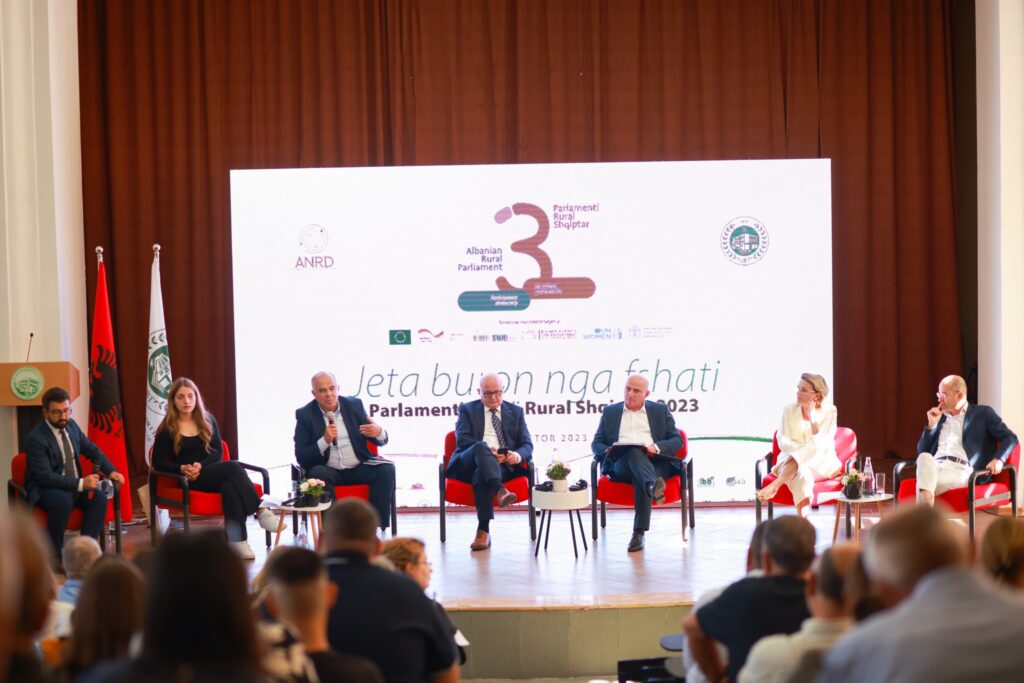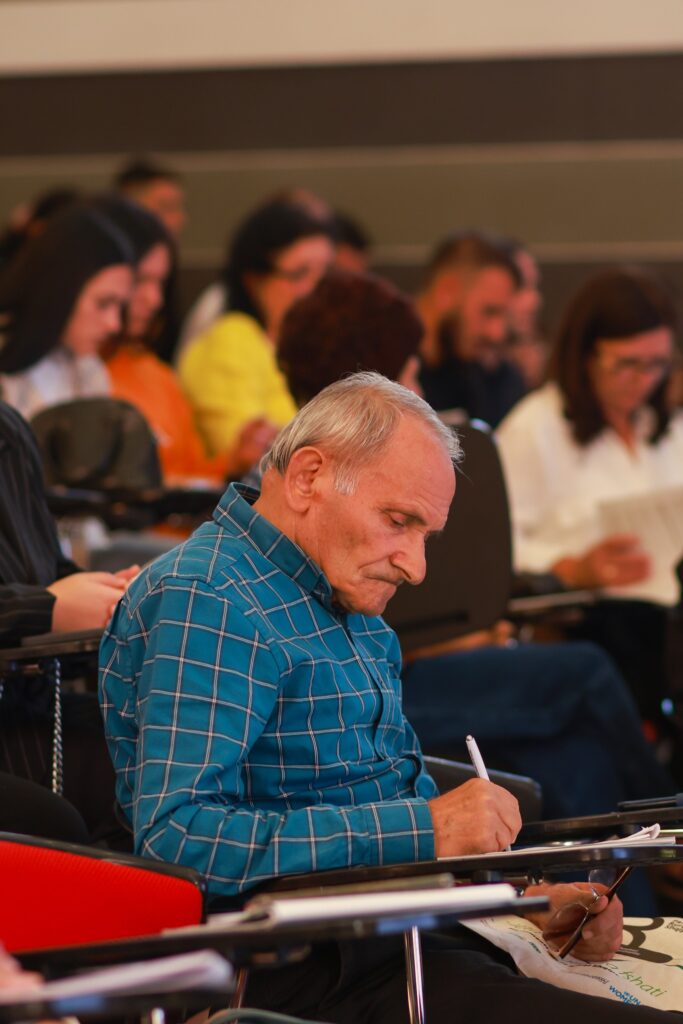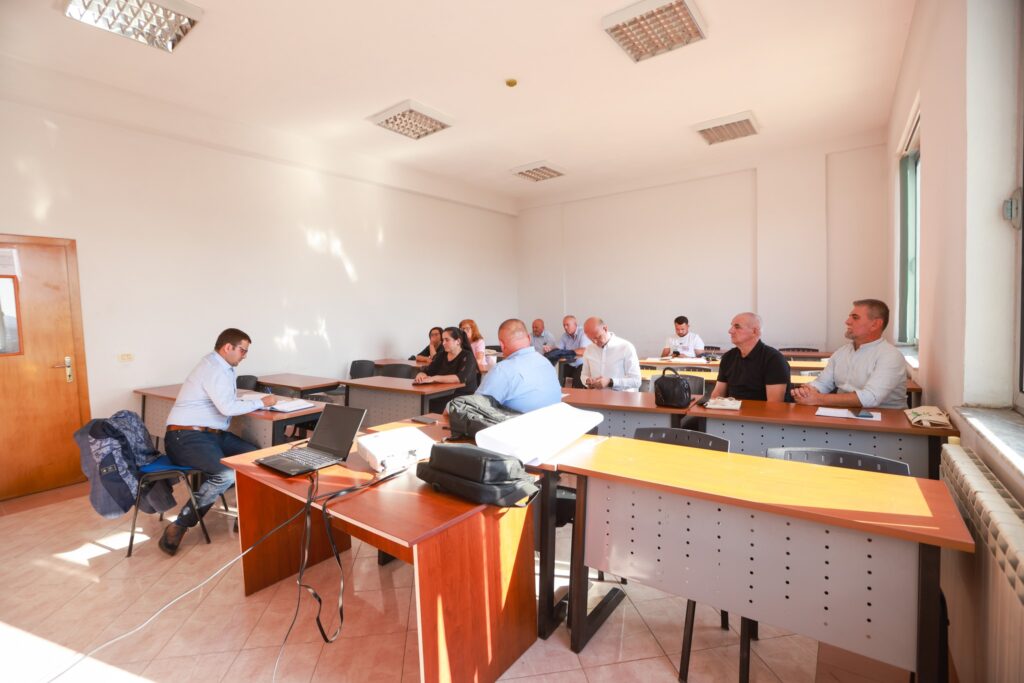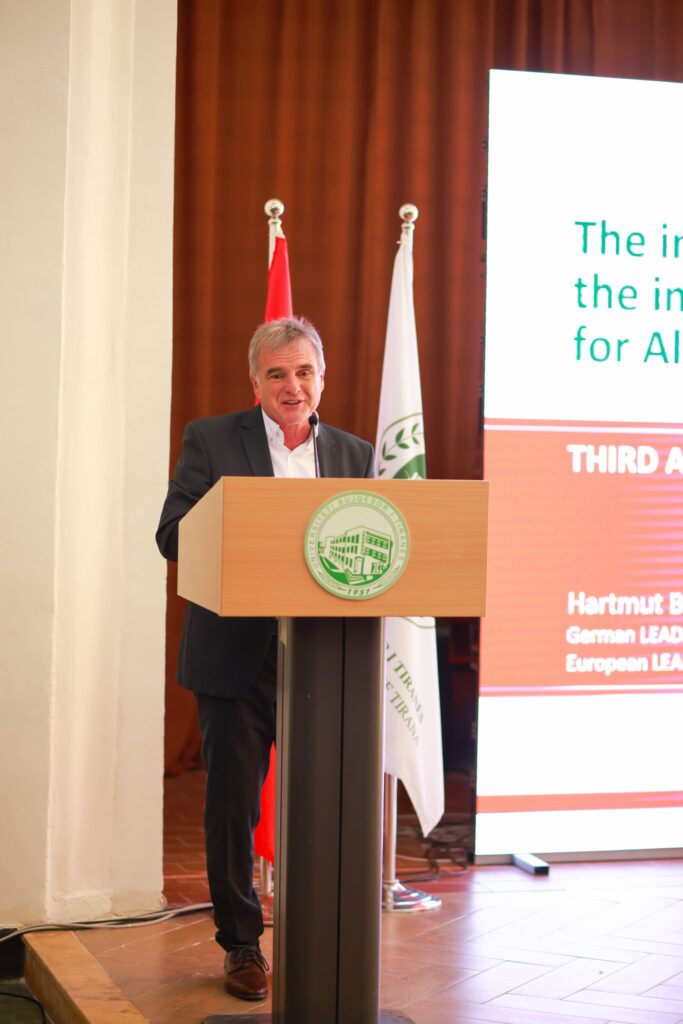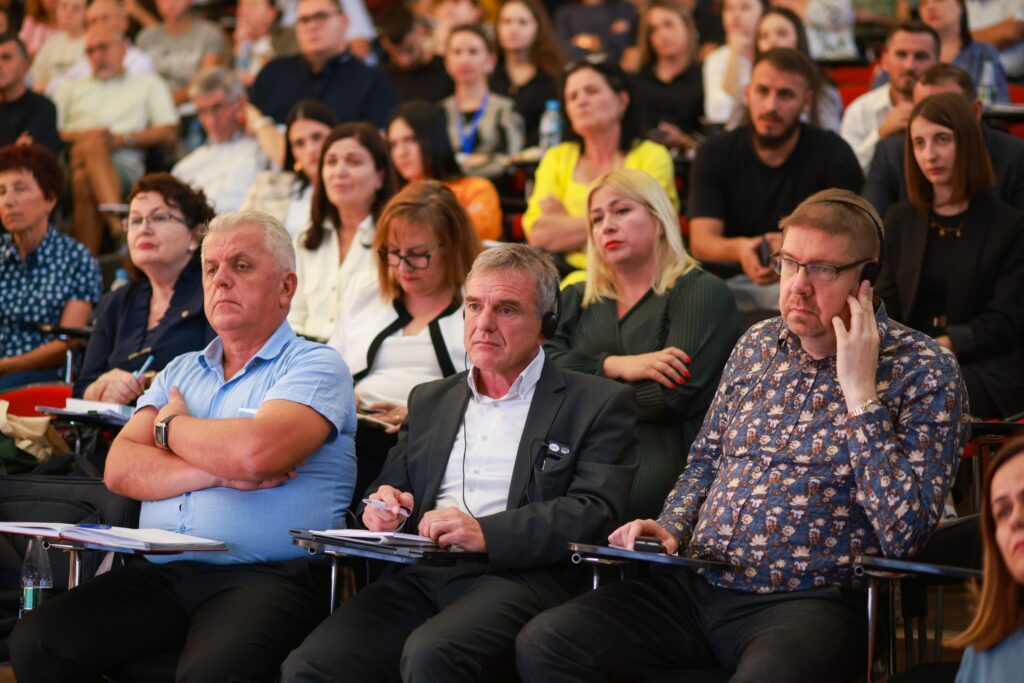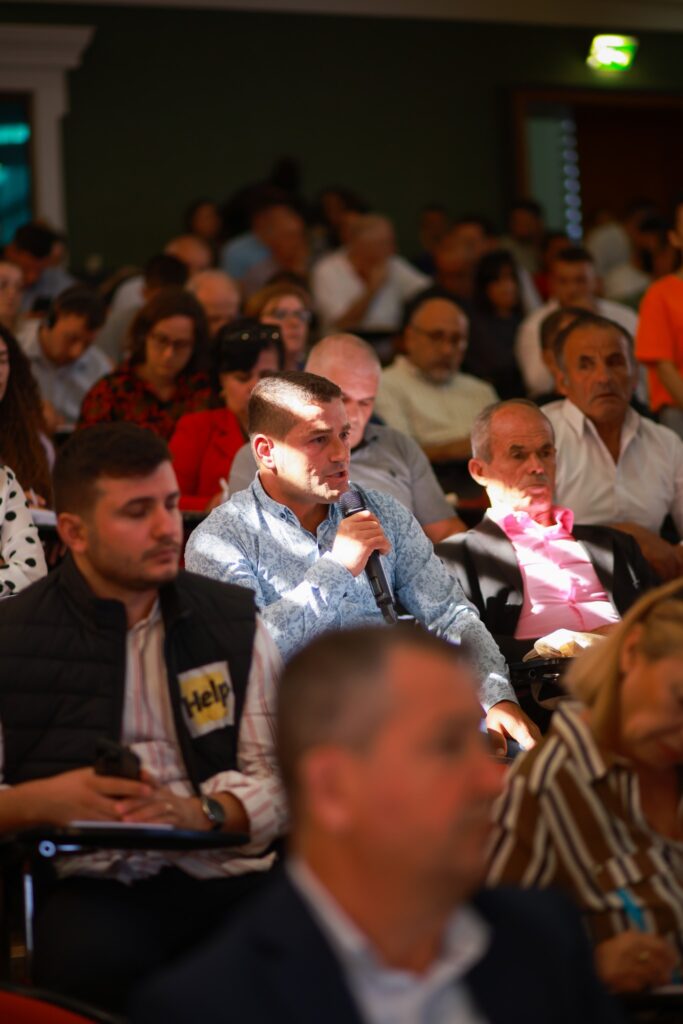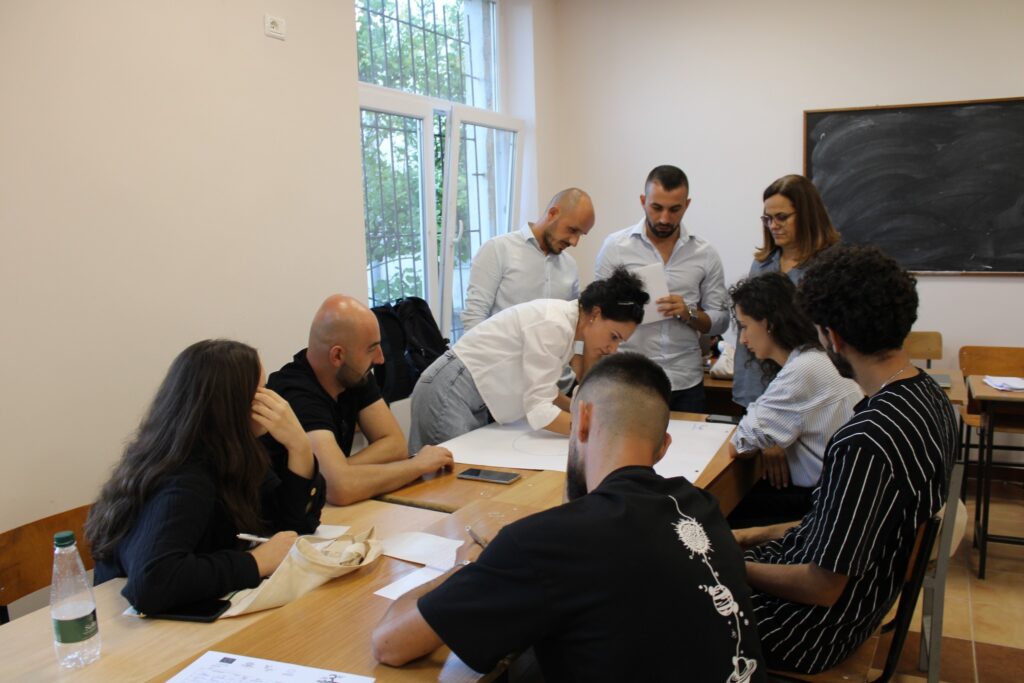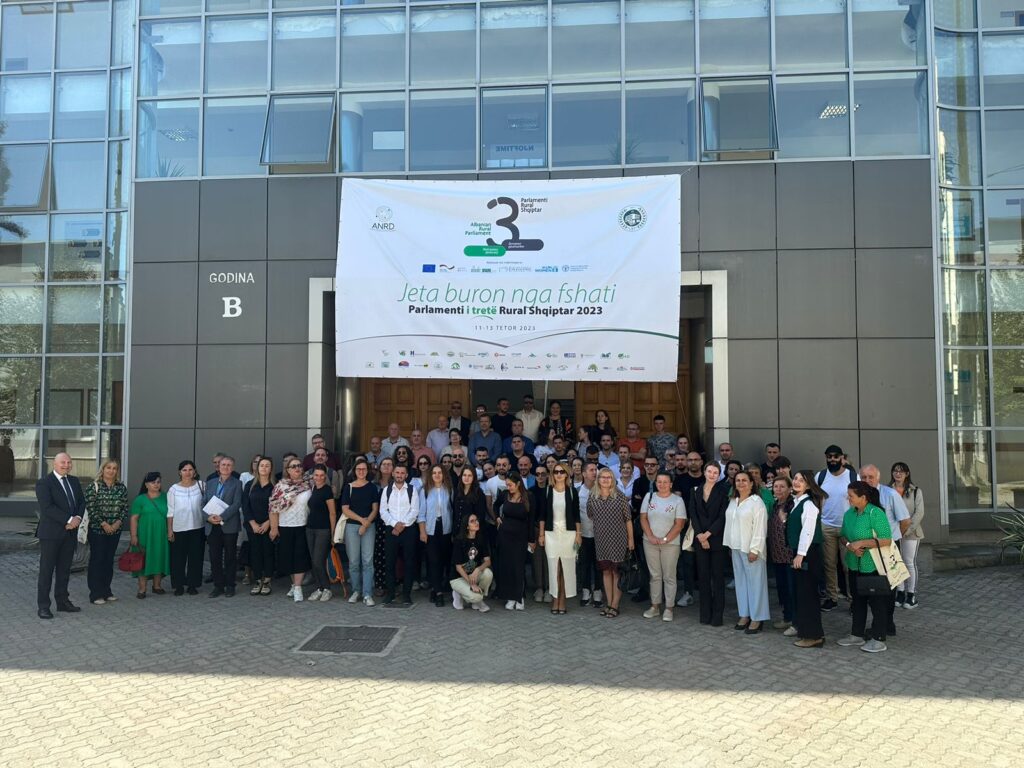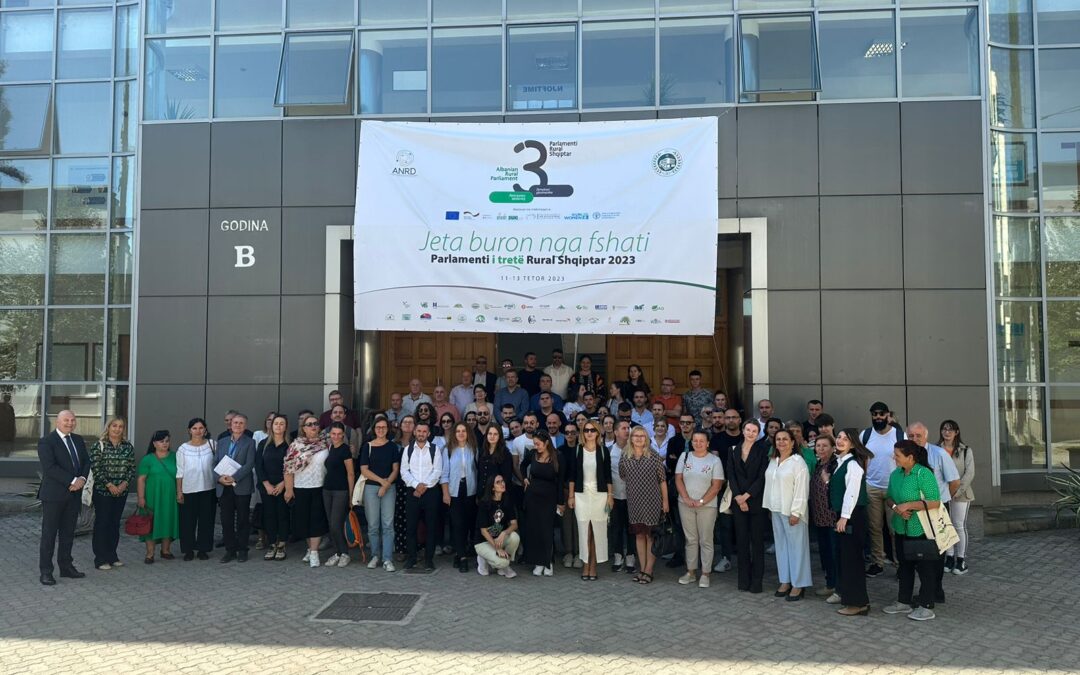From October 11 to 13, the Albanian Network for Rural Development and its 34 member organizations, in partnership with the Agricultural University of Tirana, successfully convened the 3rd National Rural Parliament. The event brought together nearly 500 participants from different rural communities in Albania, along with important actors of rural development. The aim of this event was to discuss the challenges faced by rural residents and to take tangible actions to improve their well-being.
The National Rural Parliament is a sustainable bottom-up advocacy effort, creating space for dialogue and collaboration on the most important issues of rural development. It provides recommendations for revitalization of life and economy in rural areas. The third edition of the event was organized under the theme “Life springs from the village”, emphasizing the importance of supporting rural economies, investing in infrastructure, education and creating opportunities for young people within their communities. In order to achieve sustainable socio-economic development, it is paramount to consider all aspects and include everyone. Therefore the platform of rural parliament is an inclusive and participatory effort. The three-day eventful program of the 3rd ARP created for the first time ever opportunities for young people from rural areas, young farmers, and entrepreneurs to gather in their Youth Assembly: With the youth, for the youth, by the youth“. Additionally, the 5th Edition of Pro Rural Women 2023 was organized during the Rural Parliament, focused on strengthening the advocacy for a sector, communities and a society with equal opportunities for all.
Ms. Evelina Azizaj, National Coordinator of the Albanian Network for Rural Development welcomed participants of this important event. Among other things, she highlighted: “As I stand here before you, I feel touched by the dedication that each of you brings to the sustainable rural development cause. We are here today, not only as advocates, but also as a driving force of rural development. Today, here is the heart of rural areas of Albania, representatives of various institutions, structures, groups and rural communities throughout Albania. All of us are part of the whole, we are a mosaic of different perspectives, which will enable us to discuss the most critical issues facing rural areas. This is everyone’s parliament. No one is left behind, this statement in rural development takes on a special importance knowing that to a large extent rural communities are not connected to the processes and dynamics where the main directions, decisions that influence their lives are discussed and taken.” While the Rector of the Agricultural University of Tirana, Mr. Fatbardh Sallaku expressed his gratitude to the Albanian Network for Rural Development for organizing this inclusive event. In addition other high-level representatives welcomed participants, the Deputy Minister of Agriculture and Rural Development, Mr. Arian Jaupllari, Mr. Kim Smedslund, member of the steering group of the Rural Parliament European, Mr. Ekrem Hyseni, representative of GIZ, North Macedonia.
The plenary session “Albanian rural realities between challenges and development opportunities” set the contextual framework for the ongoing discourse for the concerning rural Albania. Unlike typical panels, participants from different rural areas spotlighted specific cases and authentic rural scenario that they experience in their daily life. Aldo Shelqetja, a young farmer from the Bushat area stated: “I am a young farmer and I have a livestock herd of 100 cows and I constantly encounter problems regarding the provision of food for the livestock due to the area frequent flooding. We also face a lack of financial support from public institutions. We lack subsidy for the quantity of produced milk.” The second case was presented by Paskal Vogli, the leader of the Local Action Group “Kolonja e Gjelbër”, who stated: “Despite the fact that the approach of LEADER and LAGs is one of the most recommended methods for sustainable rural development, we face difficulties in accreditation and recognition by the Ministry of Agriculture and Rural Development.” Florentini, a young farmer from Mirdita, who invested in livestock, presented the issue of unstable agricultural and rural development support schemes, as well as the change of beneficiary criteria every year, as the main problem faced by farmers. Gjergj Kodrari, a young farmer from Dukagjini engaged in animal husbandry and beekeeping, shared his experience about the issue of land right problems, poor road infrastructure, difficulties in accessing markets, lack of veterinary services in the area.
This interventions from participants were instrumental in sparking plenary debate with panelists. Panelist reacted in offering their institutional perspective. Mr. Arian Jaupllari, Deputy Minister of Agriculture and Rural Development, in response to the issues raised, said: “The aim of the Ministry of Agriculture and Rural Development when determining the criteria for the beneficiaries of the national scheme is to increase the number of the livestock, as well as to increase cooperation between farmers. He also stated that it is necessary to draft new legislation and policies regarding climate change adaptation. Mr. Sallaku said: “The Agricultural University of Tirana is offering expertise for all the necessary training and is working on the chapters that are being negotiated with the European Union. AUT is the only institution of higher education in Albania that every year offers the labor market specialists in agriculture and rural development.” The vice-mayor of the Municipality of Vlora, Ms. Aulona Veizi, focused on the difficulties that farmers encounter in the value chain, such as the lack of storage and processing capacities or even finding export markets. Also, Ms. Veizi emphasized the role of municipalities, which contribute to all aspects of rural development, beyond agricultural production, as well as the special role of tourism development. The Chairman of the Board of ANRD, Sotiraq Hroni emphasized participatory democracy dimension of the rural parliament initiative, which is essentially related to people, to the investment in people’s trust. Mr. Hroni shared the perspective of ANRD on the practical implementation of the Government Program of “100 villages”. If it had been harmonized with the Leader approach for the development of public-private partnerships in the areas where it was invested, it would have resulted in a successful program for the benefit of sustainable rural development. Mr. Arben Shkodra – Secretary General, Union of Albanian Producers, focused on the quality and standards of products produced in Albania as well as the quality demands in international markets. He raised as a concern the lack of legislation clarity regarding quality requirements. This session was closed with one of the most active young women in rural areas, Marjana Koçeku, who is the CEO of “Neomalsore” agrotourism. Marjana started from the problems faced by young people in rural areas and closed her speech calling public institutions to consider young people as the future of the country.
The plenary session was followed by the First National Assembly of Youth in Rural Areas “With the youth, for the youth, by the youth“. The assembly gathered more than 100 young people from different rural areas of Albania. The first day of the Third Albanian Rural Parliament ended with grouping participants into 11 workshops, 3 of which were dedicated to young people. The workshops were helpful in identifying problems and possible solutions.
The second day of the parliament was dedicated to the 5th edition of “Pro Rural Women”. For five years in a row, event has become an annual tradition that serves as a platform bringing together women and girls from rural communities and engaging them in discussions about their concerns, priorities and steps that institutions and other stakeholders should take. Over 150 participants representing different interest groups were present at this event.
The closing day of the 3rd Albanian Rural Parliament served as a summary of the spirit of collaboration, networking and partnership building that defines ARP. The concluding session aimed to present a profound synthesis of discussions and insights shared thorough ARP. This session featured key messages from representatives of various interest groups and government representatives or other distinguished participants. The resilience of the rural area to crises, the need for solidarity, better structures, strategies and support dominates and reflects the Declaration of the Third National Rural Parliament, which will be shared soon with everyone. 